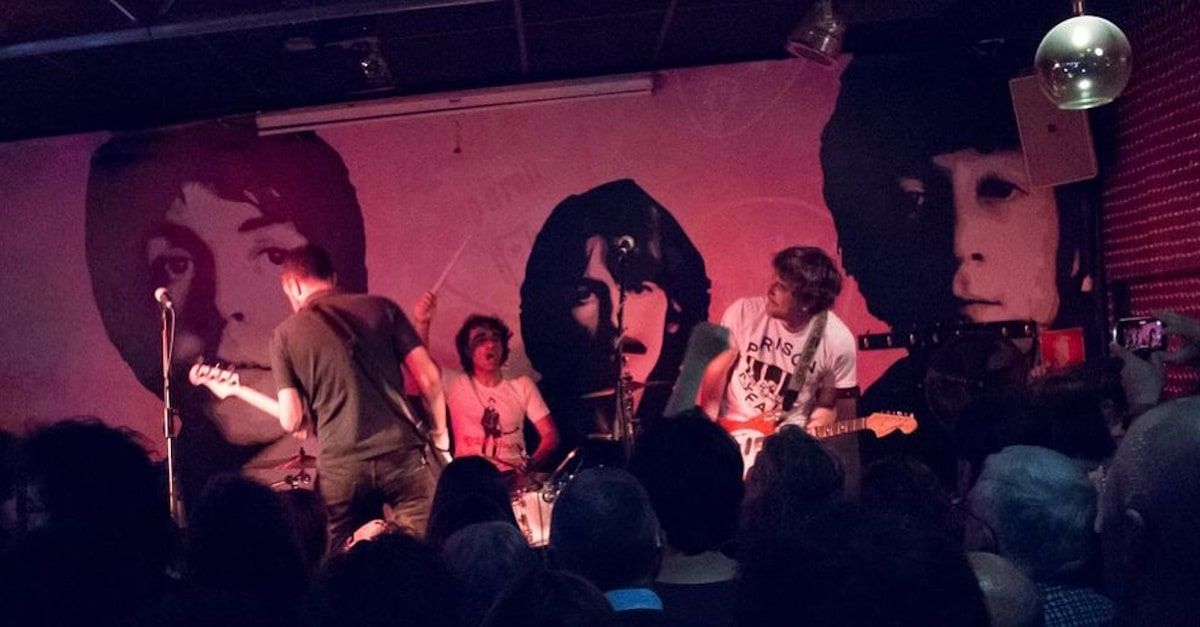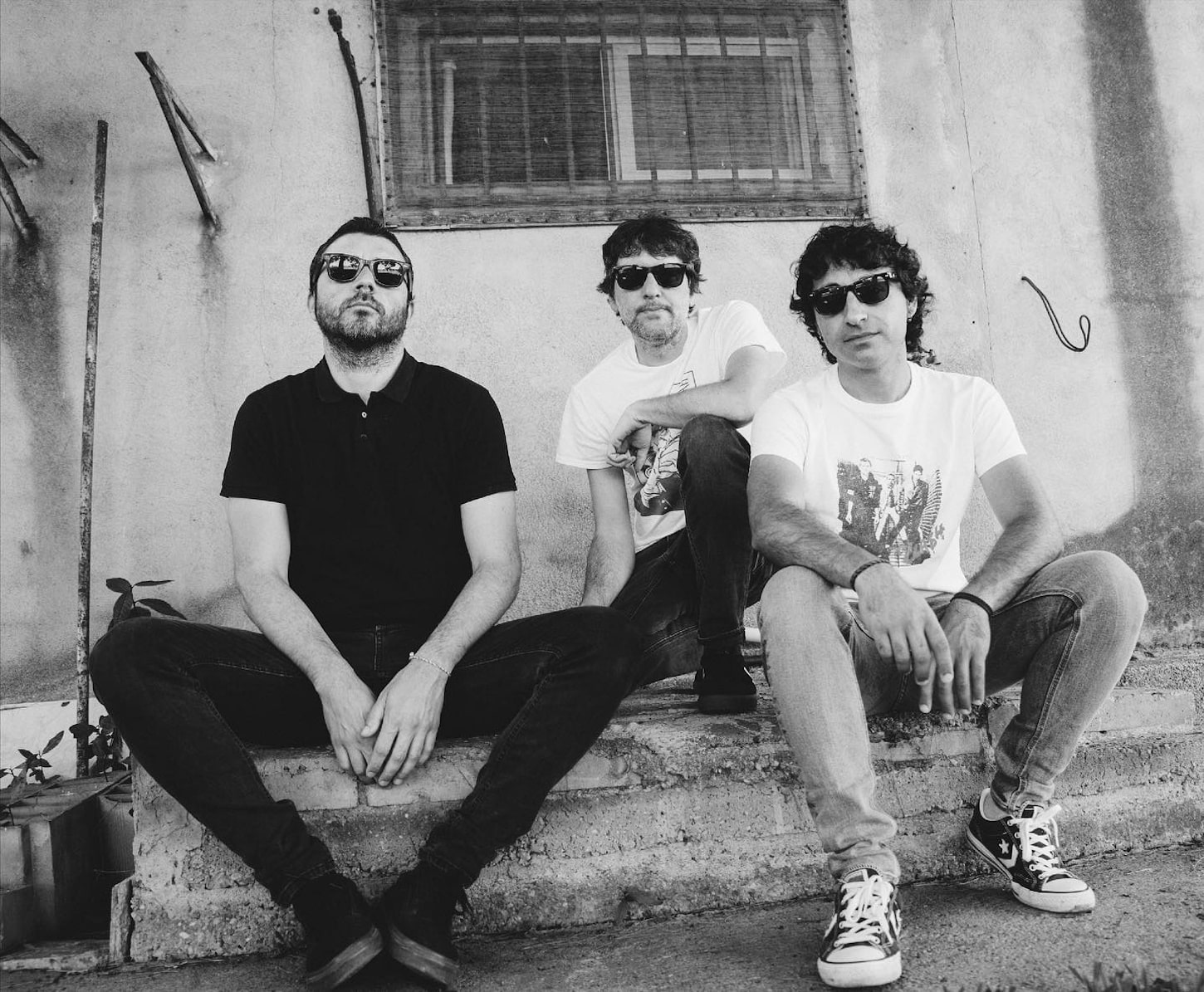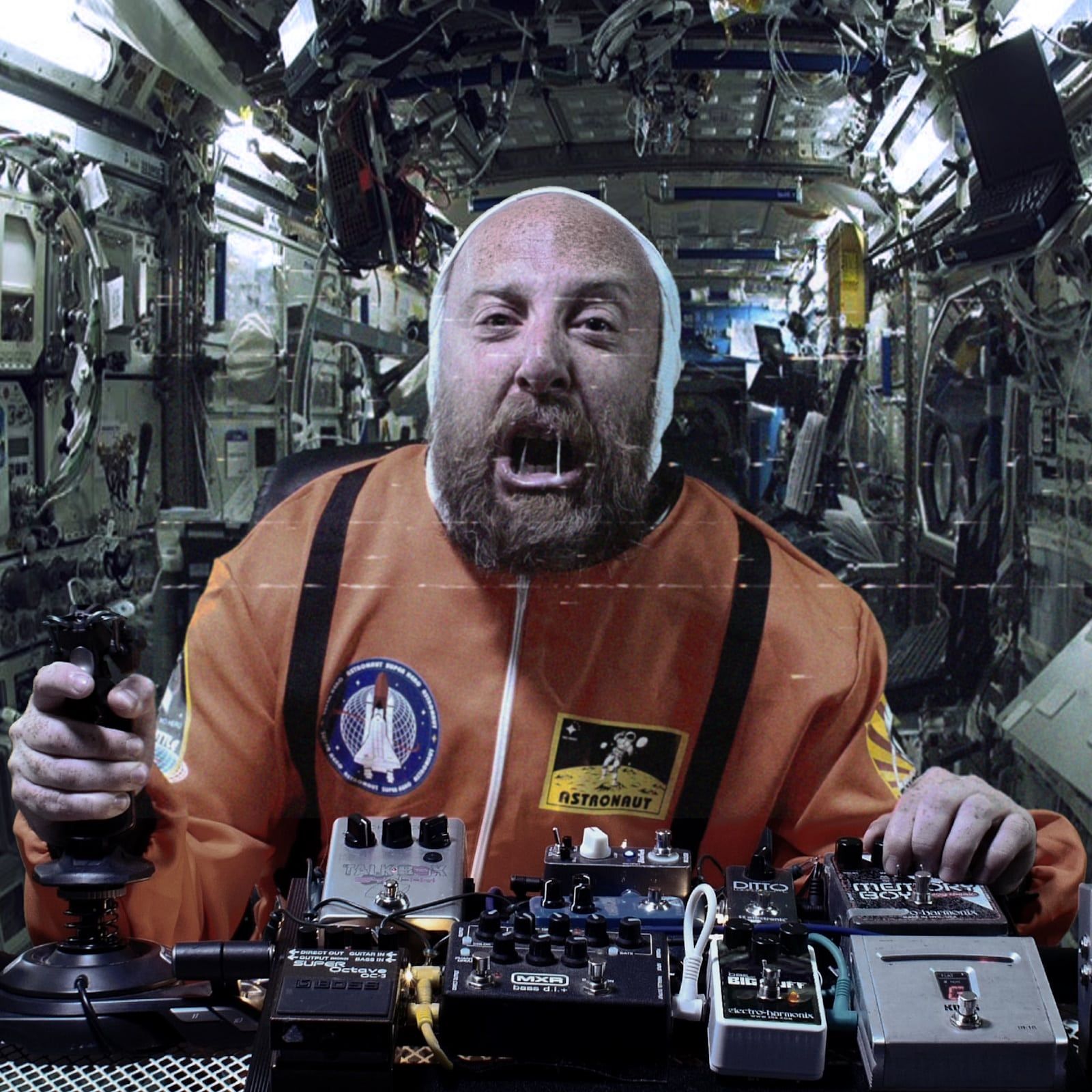When the threads of one musical journey unravel, true artists don’t retire to sulk in defeat; they pick up the loose ends and start weaving anew. That’s precisely what Pablo Beltrán and Juan Mañas did. The two, who once steered the punk-rock vessel Balloon Flights, have returned, trading the deflated helium for something with more weight and edge—Falsonueve. Alongside drummer Saül Herrero, they’re not mincing their mission: “Volumen Alto. Ruido. Melodías.” Loosely translated, it’s about cranking up the volume, letting the noise spill, and nonetheless, committing to melody.
“Can You Imagine Having Courage and Breaking Away From Everything Today?”
Falsonueve’s debut feels like a lo-fi journal scrawled in sonic ink—a range of songs that offer both a howl and a whisper. Their introductory anthem, “Eternas Promesas,” grapples with self-awareness and serves as an apt entry point into the ethos of the band. It captures the unsettled yet enduring spirit of a generation that refuses to be defined by failure. It’s not a scream into the void; it’s more like a sober, challenging conversation you’d have with your reflection.
The band emerged from the ashes of Balloon Flights, a decade-long stint that concluded with the release of what many consider their best work, “Psychologically Broken” in 2018. This is a band that is rooted in the traditions of Castellón de la Plana’s punk-rock lineage, a history rich with influences from the 90s underground scene. It is from this fertile soil of sonic history that Falsonueve has sprouted, a band evidently involved in more than just music—they’re fixtures in the community, co-organizing the BIF Festival, an annual musical soiree that has hosted acts like Biznaga and GAS Drummers.
An Album Born Amidst Pandemic Reflections
Their debut album “Unión de hecho,” pieced together between July 2020 and December 2021, exists almost like a time capsule of the pandemic’s quiet introspection. In fact, many of its lyrics sprung from a newfound emptiness in their schedules—hours that once buzzed with the cacophonies of daily life now hollowed out, providing the quietude for contemplation.
Songs on the album oscillate between urgency and introspection. Tunes like “Déjame” and “Importante” are kinetic, driven by jagged guitars, while “Ambulancia” sways into a more reflective mode, unfolding like an evening that starts off contemplative but inevitably ends up frenetic. Throughout, there’s an intelligent use of riffs and rhythms that clearly show the influences of bands like Hüsker Dü and Superchunk, yet with an emotional depth that is entirely their own.
The band describes “Unión de hecho” as a project where every track tells its own unique story—exploring themes from the pressures of work to the complexities of friendship, and the uncomfortable existentialism faced by a generation told they could have it all but left struggling to grasp even a part. Stay tuned for an upcoming feature where the band discusses the intricacies of each track, providing a deeper insight into their collective psyche.
In navigating the landscapes of sound and sentiment, Falsonueve proves that punk rock’s cathartic release isn’t always about loudness and chaos. Sometimes it’s the silent undertones and the whispered doubts that hit you the hardest, and it’s in those subtle moments of rebellion and resilience that Falsonueve truly thrives.
Today, we dive deep into each and every track from the record, provided by the band themselves.
Recorded, produced, and mastered by Santi García & Victor García at Ultramarinos Costa Brava, the album is out in cooperation with CGTH records, Hold Your Ground Records, and Sweet Grooves Records.
“Déjame”
This is the oldest song on the album. Musically, the influence of Hüsker Dü on the guitars is evident, especially in how they blend with the bassline. I had just left a job where I was replacing someone who had taken a leave of absence due to work-related anxiety, who in turn was replacing another person who had also taken a leave of absence due to work-related anxiety (I found out all of this when I left). When people have to go to therapy to cope with the pace of work imposed by the system, something isn’t right. After two months, I couldn’t bear that toxic environment and I quit. This caused me immense frustration, which later turned into a great triumph. The lyrics of this song celebrate the latter and reflect on the daily lives of many people.
“Importante”
The riff of this song and the cadence are very Superchunk. Thematically, it’s a bit lighter than “Déjame” and it’s about the typical friend who thinks they know everything and when they speak, it’s as if the world has to stop. Initially, it may repel you, but eventually, you end up loving them madly despite their way of being because, as the song says, “that’s their art.” If we were all the same, it would be very boring.
“Ambulancia”
Musically, “Ambulancia” could be a cross between Nueva Vulcano and Jawbreaker. I remember that the idea for the song came from a “meme” that my partner sent to a group the first time we met to have lunch with our best friend after being locked up for 2 months. “Con estilo y elegancia, esta noche se vuelve en ambulancia.” It means something like, “tonight we’re going to make a mess.” With this phrase in mind, we started playing in the rehearsal room, and in half an hour, we had 90% of the song done. Thematically, it’s a more symbolic than narrative song, focusing on the concept of selfless friendship, the only kind that should exist. “Ambulancia” is an ode to true friendship.
“Eternas promesas”
This song is where our love for punk bands with a more classic touch like The Clash or The Replacements is most evident. The lyrics reflect on our generation, those who grew up with the “you can achieve anything you set your mind to,” “if you study a university degree, you’ll have a job and a good salary,” “embrace the culture of effort,” etc. Millennials felt an intrinsic pressure to be “someone” by obligation, and it seemed like the path was set for that. The 2008 crisis (which never really left Spain) took away all those promises and left many of us with a perpetual sense of failure. There’s a line Juan shouts at the end that says: “Another promise that is pure weakness. And everyone demands money and greatness. What happened to that dream? Where has it gone? No trace of ascent, Straight to hell.” It’s a good summary of what we wanted to convey with this song.
“20 Veces”
Musically, it’s a song with indie rock vibes but with a very pounding punk rhythm. It’s about a couple that had been so influenced by external noise in their social circle that isolation due to the pandemic helps them rediscover each other and reconnect. It’s an attempt to find something positive in everything that was happening then (quarantines, isolation, fear…) and at the same time, a reflection on how important it is in a relationship to turn off the external noise and truly listen to each other.

“Un Mundo perfecto”
Here, we wanted to give our own nod to Los Planetas, with the rhythm, vocal tone, some details in the bassline, and changes in intensity. We also wanted to incorporate some My Bloody Valentine-style guitars after the first chorus and at the end. The song ironically addresses the dark side of excess in nightlife and partying, the side that isn’t so fun, and how it can become burdensome over the years.
“El Fadrí”
A pop song with a punk edge. It took a while to come together; we had the chorus but the rest resisted until we finally cracked it. The responses/chorus to the main vocals in the verses have a sound effect that Guided By Voices often uses; this sonic reference was Santi’s idea. Thematically, the chorus talks about a broken relationship, and from there, we play with the concept of how curious it is to carry a sentimental breakup (whether romantic or in friendship) in a small city like Castellón, where practically every time you go out, you can bump into that person. El Fadrí is a very emblematic bell tower we have in the city.
“Nivel”
The guitar is tuned to drop D, giving it a more emotive sound. Biznaga or Dinosaur Jr (especially in songs like “The Wagon”) might be the main influences here. The protagonists of the song are the same couple from “20 Veces,” but this time, it tells the story of the first time they met alone and spent the whole night celebrating their encounter, without the baggage that later builds up in all relationships. It aims to capture that moment of pure and genuine joy.
“Calla”
Here, we wanted to create a classic punk song with a lot of punch. The guitar at the beginning and the way we enter the song are reminiscent of Cuello. Thematically, it’s a two-minute shout against people who drive you crazy. Plain and simple.
“La Gran Belleza”
This is the other song where the guitar is tuned to drop D. We wanted the song to build in intensity until the end. The lyrics are a reflection inspired by watching the movie “La Grande Bellezza” by Paolo Sorrentino. In the film, you can see the characters living in absolute luxury: huge mansions, drug-filled parties, French champagne, elegant cars… Yet, at no point do you want to live that life because the characters are utterly empty, and their social relationships even more so. Something similar happens when you watch the series “Succession”. You just don’t want to be there.
“Como tu”
For the rhythm at the beginning, we drew inspiration from Hüsker Dü’s song “New Day Rising”. In the verses, there’s a second voice that doesn’t sing the lyrics but rather speaks them, and it works great; it was Santi’s idea. It’s a straightforward song both musically and thematically. It poses a question: “Will we end up becoming what we hate the most?”
“La Orilla”
We wanted to create an “epic” song with changes in intensity and rhythm that builds up to a noisy climax, taking inspiration from both Los Planetas and Nueva Vulcano. The lyrics are a metaphor for first times, those sensations that you can only experience once in life and no matter how hard you try, you can never recreate them. In the story, the protagonists are at Las Planas bar (a legendary bar in Grao de Castellón), and after leaving, they take a long walk to the beach shore.
Want to keep the beat going?
IDIOTEQ is a one-man DIY operation, tirelessly spotlighting the local cultural scenes and independent bands that often go unreported elsewhere. Born in the early 00s, this platform has been committed to giving hard-working artists the high-quality coverage they truly deserve.
No ads, no distractions—just pure inspiration and a genuine focus on independent artists and their stories.
Please consider helping keep IDIOTEQ ad-free and in tune with the indie scene by donating today.
DONATE via PayPal 𝗈𝗋 SUPPORT via Patreon
100% of the funds collected go toward maintaining and improving this magazine. Every contribution, however big or small, is super valuable.
Your support ensures that we continue to be a place where you can discover, learn, and get inspired, without any advertising noise. Thank you for being a part of this musical journey.










